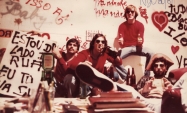
One of the leading video production companies of the 1980s, TVDO played a key role in consolidating Brazilian video art, alongside another important group, Olhar Eletrônico; the latter was characterized by strong creative interaction with open television programming, while the former travelled a more experimental path, even though it entertained the ambition of intervening in mass media. The group was formed in 1980 by four film and five television students who met at Multimedia Internacional, an electronic media show held by Walter Zanini in 1979. They were: Tadeu Jungle, Walter Silveira, Ney Marcondes and Paulo Priolli. In 1984, Priolli left and Pedro Vieira joined the group. In September, 1980, they were invited by Ana Mae Barbosa to coordinate the TV Workshop at Semana de Arte-Ensino. The collectively-held event gave rise to the group’s working format, which its members named “TVTudo”or “Tvudo”. While still students, they made Programa do Ratão as their conclusion work for a discipline at the School of Communications and Arts at the University of São Paulo (ECA/USP). On that occasion, Antonio Abujamra took them under his wings as protegés. The program Bvcetas Radycaiz attracted the attention of Nelson Motta, who invited them to co-direct the Mocidade Independente program in 1982. On the same year, they associated themselves with Eduardo Abramovay and set up Videoverso. In 1984, they produced the daily show Radar, which remained on air for four months. From 1983 onwards, they won the Best Video prize on three straight editions of the Videobrasil Festival. In 1986, they set up Academia Brasileira de Vídeo, a free film and video school. In 1987, they became affiliated with the Fonte Brasil – Vídeo production company, chaired by Zanini. Highlights among the group’s creations include a trilogy comprised of Frau, from 1983, Non Plus Ultra, from 1985, and Heróis da Decadên(s)ia, from 1987. The group gradually dissolved in the late 1980s.